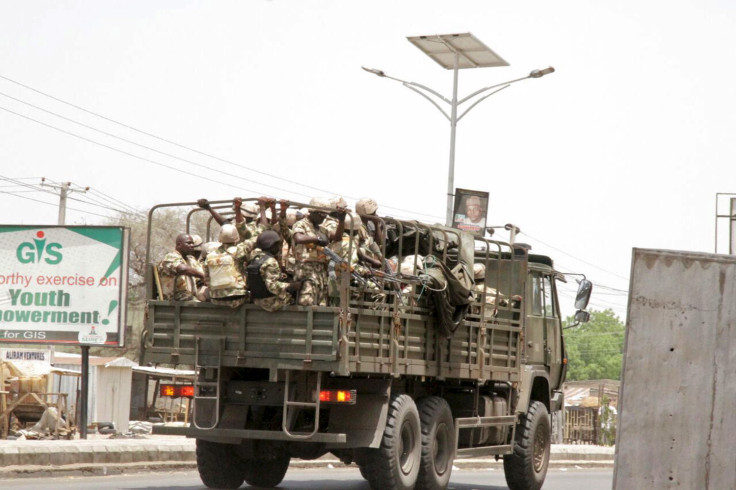Nigeria Boko Haram: Three female suicide bombers die in failed attacks near Maiduguri

Three female suicide bombers have died in failed attacks near the town of Maiduguri, capital of Borno state, the epicentre of terror group Boko Haram's insurgency.
Who are Nigeria's Boko Haram terrorists?
Boko Haram fights against Western influence in Nigeria and aims to impose its version of Sharia law on the country. The group declared an Islamic caliphate in Gwoza, along the Cameroon border, in August 2014.
Boko Haram has raided several cities in the north of the country in a bid to take control of more land.
Three states − Adamawa, Borno and Yobe − have been under a state of emergency since May 2013, due to Boko Haram's attacks.
Suicide bomb missions are usually carried out by Boko Haram (recently renamed Iswap) members or by civilians who have been kidnapped by the group and are forced to blow themselves up in crowded areas in north-eastern Nigeria.
A police bomb expert who spoke under condition of anonymity told news agency AP that the bodies of the women were cut in half when the devices were detonated.
It is believed the explosions did not cause other casualties.
The failed attacks occurred shortly after the Nigerian military headquarters were relocated from the capital Abguja to Maiduguri.
Newly elected President Muhammadu Buhari said the headquarters will stay in Maiduguri until the fight against the terrorists is over.
The Nigerian government is being aided by mercenaries and troops from neighbouring countries Chad, Benin, Niger and Cameroon in its offensive and has scored some successes since the military co-operation started in February.
Nigeria
Capital: Abuja
Population: 174,507,53 (2013 census)
Largest cities: Lagos, Kano, Abuja
Major ethnic groups: 21% Yoruba, 21% Hausa,
18% IgboLanguages: English, Hausa, Igbo, Yoruba
Religion: 50% Muslim, 40% Christian, 10% other
Currency: Naira (N) 1N = £0.0033; US$0.0050
Buhari met with regional leaders on Thursday (11 June) to discuss future military strategies. He said during the meeting that Nigeria should lead the anti-terror joint offensive and that a proposed six-month rotating command among the five nations could disrupt operations.
He was quoted by AFP as saying: "Six months duration as it is being proposed... does not augur well for effectiveness and efficiency. Such a process will undermine, even if it is not intended, the military capacity to sustain the push against the insurgents, who also have the uncanny ability to adapt and rejig their operational strategies.
"I'm inclined on account of the above to suggest to your excellencies... that Nigeria retains the position of the field commander of the MNJTF [Multi-National Joint Task Force] for the period of the war effort."
More about Nigeria
Colonisation
Between 1790 and 1807, Britain acquired an estimated 2,000 slaves per year from Lagos, Nigeria's largest city. In 1807, Britain stopped the practice after the implementation of the Slave Trade Act and annexed Lagos in 1861 after it bombarded the town deposing leader Oba Kosoko – who supported the slave trade – and helped install Oba Akitoye.
Independence
Britain officially occupied Nigeria from 1885 until 1960, when the country gained independence.
Biafra and civil war
Tensions due to political differences among Nigeria's main ethnic groups – the Hausa, Igbo, and Yoruba – as well as perceived corruption in the political and electoral process culminated with several coups d'etat, which further ignited tensions between the north and south of the country. The situation further worsened when the then Eastern Region declared independence from the rest of Nigeria and proclaimed the Republic of Biafra in 1967.
A civil war ensued when the Nigerian army invaded Biafra in 1967. The 30-month conflict resulted in the death of between one and three million people and the end of the Republic of Biafra. Hundreds of thousands of people died of starvation as a result of restrictions on Red Cross aid and food supplies to Biafra imposed by the Nigerian government.
Terrorism
Ethnic tensions between Christians and Muslims in the country started during the colonisation era, when the British promoted the spread of Christianity in the Bornu Empire – modern day northeast Nigeria – ruled according to the principles of the Constitution of Medina, believed to have been drafted by the Prophet Mohammed. Violence increased when the Muslim sect Yan Tatsine instigated deadly riots in Kano state. As a result, the sect leader was killed and violence spread across other cities in the north east.
In 2002 Mohammed Yusuf founded Boko Haram – translated from the Hausa language as "Western education is forbidden" – attracting unemployed poor Muslims with his rhetoric focusing on the country's widespread corruption. Boko Haram is still active today and aims to establish an Islamic Caliphate in northern Nigeria where it fights against Western influence and aims to impose its version of Sharia law.
The group, now led by Abubakar Shekau, has killed thousands of people since its insurgency became violent in 2009 and declared an Islamic caliphate in Gwoza, along the Cameroon border, in August 2014.
Three states − Adamawa, Borno and Yobe − have been under a state of emergency since May 2013, due to Boko Haram's attacks.
© Copyright IBTimes 2025. All rights reserved.




















